采访:Jerry Chan Interview
By Josh, 2012年 8月 9日
《 看中文采访 》
Anyone interested in Beijing punk/rock history — or the history, anthropology, and sociology of urban music in general — should look into getting their hands on Inseparable by Dave O’Dell. To quote his own press material, Dave “spent many years helping and developing some of the earliest punk bands in Beijing from 1995-2003.” Inseparable catalogues this time period in minute, first-person, sex-drugs-and-dirty-punk detail. Pretty much the Please Kill Me of the Beijing scene. Really, grip it.
One memorable portion of the book details the formation and short life of Cocktail 78, a proto-supergroup featuring Xiao Rong of Brain Failure, Jonathan Leijonhufvud of PK14, Christiaan Virant of FM3, Dave (who at the time was also playing bass in Brain Failure), and Jerry Chan. These days, Jerry is best known as a Beijing media veteran: founding editor of the Beijinger and editorial director of the True Run Media empire. But in 1999, he was a starry-eyed F.O.P. American just starting out, ready to sow some wild oats in the raucous fin de siècle Beijing rock scene. Writes Dave:
Word had gotten around that we were starting up a band of sorts and Jerry Chan was interested in joining us. Jerry was a freelance writer who had come to Beijing when the Beijing Scene newspaper was just getting shut down… Jerry’s intense front-man looks and lyrics were perfect for the edge that we were pumping out… Our [first live] set opened with a powerful song we titled “Down to the River” and in seconds Jerry Chan became the dream front man of any band out there. He exploded with an energy that was unseen in our rehearsals.
Eventually Jerry integrated himself into the rock scene as an observer and, later, a media promoter. Pangbianr sat down with Jerry at True Run HQ last December for an hour-long talk about his “Beijing rock experience” and how the scene has changed from the halcyon days of the late ’90s:
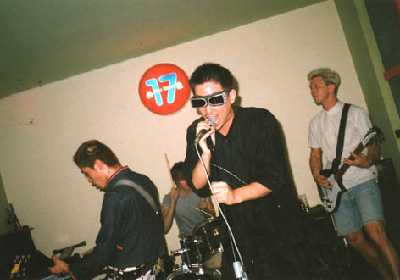
pangbianr: Let’s start with Cocktail 78. In retrospect, that band’s lineup is pretty crazy. How did you come together?
Jerry Chan: Well, when I first moved to Beijing in ’99, the scene wasn’t even really a scene. It was just much smaller. So everybody knew everybody, we were all friends. I was quite close to Christiaan at the time… I haven’t seen the guy in years, but he was just at that point getting out of journalism. Before that he was actually quite an accomplished journalist and he was just kind of in between, he was having a career transition. We were hanging out and both of us really loved music so we spent a lot of time talking about music. At that time also, Jonathan, Jonny, was just starting to come to Beijing, and he moved to Beijing around that time. I first met him at an International Noise Conspiracy show, he brought them to Beijing. That’s how we met him. He moved here as well, we hung out a lot. We were just really good friends, and we started making noise. We just wanted to have fun. And Dave of course was around, at the time he already had a Chinese rock website going, he had been doing that for a while. Dave was kind of the big entrepreneur of us at the time, because he had had investment for his website from a guy named Peter Loehr… but this was of course on the tail end of Web 1.0, so unfortunately Dave’s website didn’t last. But he had a little business going.
So, we just decided to start jamming at a rehearsal space that we knew of through Dave’s friends Gao Yang and Gao Wei who were in Underbaby. If I recall correctly, it was actually in their compound.. and I don’t even remember where it was, somewhere up north, it was in a bomb shelter. It was literally one of those dixia shi [地下室, cellars], so we just started playing there, just making noise really. We had a very loose idea of it. We just wanted to do something loud, and abrasive, and fun. And everybody had somewhat similar tastes, but were also coming from different areas of interest. We started rehearsing and we came up with a set, and we had like 8 to 10 songs if I recall correctly. I don’t even remember. It was kind of a daze. But the one song that seemed to work out the best was that song [“Over”]. And that wasn’t even the best take, we had some really good takes and unfortunately… Jonny is such a perfectionist, he was trying to get that perfect take and I remember him taping over it… For us it was a pretty real experience, because we were really not intending to do anything with it other than just have fun. It was really loose… all we really wanted to do was just play some shows, you know.

Dave O’Dell (left) and Xiao Rong (right) at a Brain Failure show, October 2000
So the opportunity came up, and you know everybody was busy with their other projects. Of course Xiao Rong was busy with his band [Brain Failure], Jonny had some things going, Christiaan hadn’t yet started doing FM3, but soon after that he started hanging out more with Zhang Jian and making, you know, noise and soundscapes and things like that. I was kind of in between jobs really, there was a lot of stuff going on in my personal life at the time. But the opportunity came up and Dave said to us one day, “Hey, I’ll put up some money, let’s record some stuff. We gotta record some stuff.” And so we found this recording studio, that we had heard about in Xinjiekou, I think it’s still around.
pbr: Do you remember the studio’s name?
JC: I forgot… Jonny would know. It was a recording studio that they used to record classical music, so all the sound engineers were very old school, but it was a great analog studio. We just rented the space and put up the money and then we recorded these two tracks, I think we spent an afternoon doing it.
pbr: So they were recording on tape? Reel-to-reel?
JC: I think so, yeah, if I recall correctly… It was a… I mean this was I think 2000, but these guys were in their 40s and 50s, they were old school. The funniest part of that day was just them, because they had never dealt with people like us before. And we were pretty… I mean we didn’t wreck the studio or anything, but I was pretty drunk. I was drinking a lot at the time, and I think for that session, because we had had hotpot for lunch, and this was when… you know, early on in your Beijing life, everything is great. Erguotou [二锅头, cheap sorghum liquor] is awesome. It’s the best thing. Then of course you have a few bad erguotou experiences and you… But I was still in that stage where erguotou is great, so I drank a bunch of erguotou and just had a Beijing rock experience that afternoon.
Beyond that, we played a few shows… unfortunately I missed the best show. Who knows, maybe it wasn’t the best show in terms of quality, but they played a gig on the Great Wall. I was having girlfriend trouble… or actually no, I was not having girlfriend trouble, but that girlfriend soon turned into trouble. I was playing house with this girlfriend, and for some reason, I can’t remember what, but I missed that show. So they played on the Great Wall, and that was one of the first of what they were calling “Great Wall raves.” And so, Shen Yue from [Anarchy Jerks] stood in, was me that night.
Not in China? Watch on YouTube.
Other shows we played were also pretty memorable. There was an old punk venue, it wasn’t even… it was just a small live music venue/rock club, by Zizhuyuan Park, it didn’t last very long. We were supposed to play a show there, and they lost power. So we ended up playing on the sidewalk in front of the venue, like at 6 o’clock during rush hour. That was fun, and I’m sure it sounded terrible, I mean the acoustics you know, but it was really punk rock. Everybody that watched us was like a mingong [民工, migrant worker], so we had a bunch of mingong just standing there, and we had a lot of people making fun of us. But it was fun. Then we also played a lot at, there was a venue owned by Zang Tian Shuo, called Rainbow Room or something. We played a few shows there to like, 30 friends. And we played a show at the old Keep In Touch, which was originally at the Kempinski [5 star hotel] and moved to a really stinky river by the [Beijing] Film Academy. We played as part of a festival there. And there were a few other random shows. I think all in all we played like 6 or 7 shows and we had that one recording session.

Cocktail gig at Water Mark club near Beijing Worker’s Stadium, June 2000
And then a few things happened personally. My father got sick, so that was one reason. We just stopped rehearsing. And then everybody just kind of moved on. But it was about a six-month period where we were doing this band, and it was just a lot of fun. I do regret… I wish we had recorded a bit more, but at least we have that one song.
pbr: So from that studio session, that’s the only song that you kept?
JC: Well we have another song recorded but it’s just really not good. My vocals are completely off, out of synch. It was like the second song recorded and I was so blizznottied out of my mind by that time… That was more of our attempt to do the Stooges. I’m a big Stooges fan and I was trying to do the Stooges anyway, I don’t know about those guys… So it was kind of our Iggy/Stooges garage rock thing. Jonny was quite familiar with music and Xiao Rong had his sound, but the one that worked a bit better was [“Over”]. But even that one wasn’t as tight and well-executed as… there was one take that was probably the best music recording I’ve been involved in in my life, but it just got… I remember, that was that one song you know where at the end you record and everybody’s like “Yeah! Hell yeah! That was awesome!” and for some reason Jonny was like, “No! That’s not good enough, let’s do it again.” And then every take after that.. I think that was one of the later takes that we did, and my voice was already starting to get shot. I used a megaphone, but at first I wasn’t using the megaphone, but I actually started using the megaphone because my throat was starting to get shredded. I wish we had the take where I didn’t use the megaphone, hopefully it would have sounded better.

left to right: Jonny, Xiao Rong, Christiaan at the studio
But [the band] was a cool experience because different members of that group went on to do other interesting things. I think that was a really unique and interesting time in Beijing rock history because it hadn’t quite blossomed yet, but at the same time it hadn’t segmented yet, if you know what I mean. In those days, it was like, the punks would go to a rave and not have a problem with it. And Cui Jian would go to everything, because he was just trying to support everything. [It] was a lot less genre-specific. And you know, I’m a genre-ist too, we all are. If you’re into music, you tend to think of music in genres. But one really good thing about that time was there was a lot of energy. As far as a sophistication of sound or aesthetic, no, it wasn’t that developed. And quite frankly a lot of stuff that was coming out, including stuff we were doing, was just not that good. But there was a lot of genuine enthusiasm and there was a real nice vibe to the scene. It wasn’t that catty yet. At that time there were the metal guys, and then there was the Modern Sky crowd, and then there was also the Wuliao Jundui [无聊军队, Boredom Contingent] crowd, and then there was also the nascent DJ thing with Wengweng and those guys. Everybody knew each other, it was just like a big high school lunchroom. There was no animosity, but there was definitely little cliques. But you could still be like, “Hey,” you’d still see each other, you’d go out to a venue and you could see [everybody]. There was one thing going on every weekend, and you’d go. Dou Wei concert, everybody would go. Cui Jian would play, everybody would go. It was a social activity obviously as much as a musical event. It was raw but real. It was fun.
pbr: One thing I’m interested in is the origins of the Chinese experimental scene. One thing that you’re saying, and also I’ve talked with Yan Jun and Yang Haisong [of PK14] about, is that it seems 1999 was a big year. That’s when Yan Jun moved to Beijing, that’s when Yang Haisong moved, and PK14 didn’t really have any other bands that sounded like them, but they felt at home in the scene. And obviously Yan Jun, now he does esoteric sound art, but at that time he was just in it, in the punk scene, in the rock scene. Both of them mention that that window of time was more special and felt more underground than now.
JC: Yeah, it was. I knew Yang Haisong at the time. I didn’t know Yan Jun, but I’ve observed his career develop and I totally respect the guy, I think it’s cool that he’s been able to carve out a great niche. My tastes in music are slightly more conventional, but I really do like the aesthetic of noise, because when I was in college and high school I was quite into industrial, things like that, and I had some exposure to more noisier, edgier stuff. Even now my tastes, even though they skew more towards hip hop or jazz or reggae, things like that, I [still] like that edge. But ’99 was cool because no one knew what they were doing. People were just doing it. Not just in music. I remember hanging out a bit with Zhao Liang, he’s now a very well-respected video artist. But he was just playing with video editing equipment. We had a very early That’s Beijing — we were called That’s Beijing [at the time], that’s the name that shall not be spoken now in this office — but back in the day when we were called that, we were organizing monthly rock showcases, music showcases. I remember Zhao Liang being at one of them, this was right after 9/11, and it was weird because homeboy had a loop of the Twin Towers being crashed into, and we’re all just kind of like, “Oh my god…” But then it was interspersed with this praying mantis eating its young. And it was kind of comical, but it was also… thinking back to it, it was like, that was cool. Not necessarily in sophistication or execution, but it was just people really curiously exploring and learning.
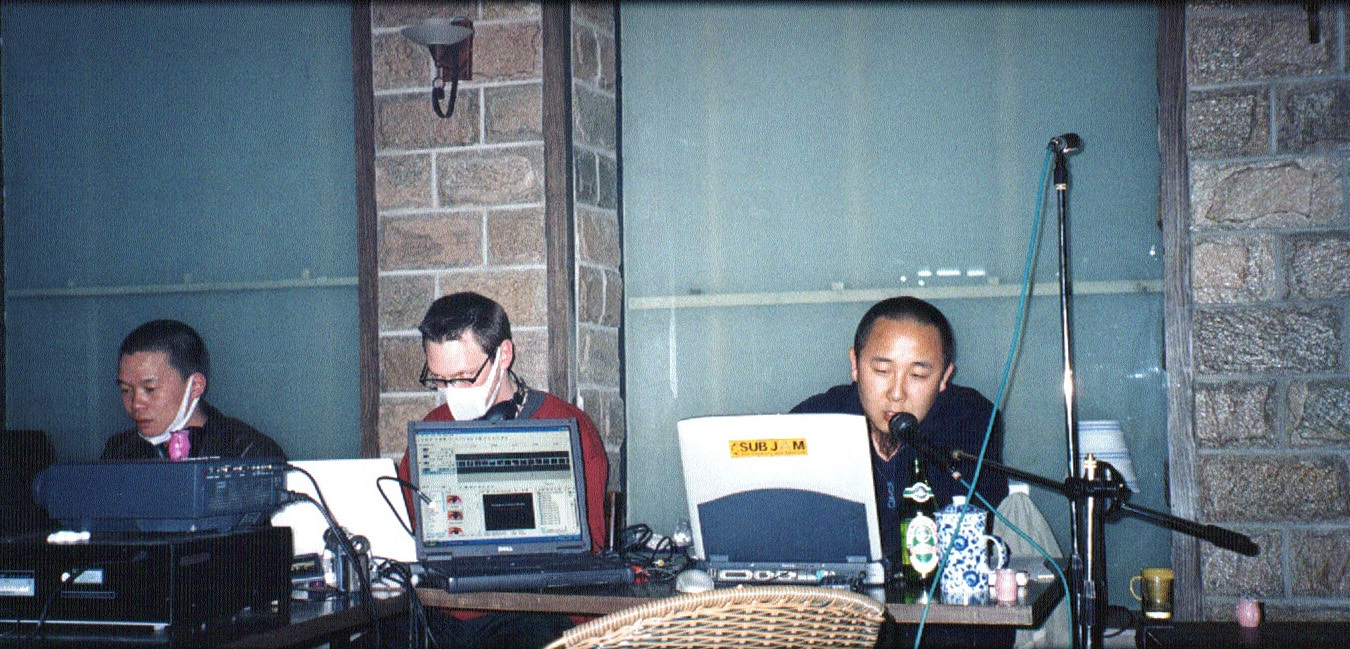
Christiaan Virant (center) and Zhang Jian (left) of FM3 perform with Yan Jun (right) and video artist Wu Quan at Wansheng Bookstore in Haidian, 8 April 2003
And everybody was kind of on that same level. I think with early FM3, I wasn’t alongside them for most of their evolution, but those early times it was just literally sitting around Christiaan’s apartment, and then Zhang Jian would come around, and those guys really hit it off, and they were just having fun playing large keyboards. You know, because Christiaan is a classically trained pianist, and Zhang Jian was also a really great keyboardist and pianist, and they were just like, “Oh my god, you can do this!” And “Oh my god, there’s this thing called Fruity Loops, that’s crazy!”

Feng Jiangzhou performs with Dead J, Yangtao, Jiajia, and LiuYuan
And then even in other areas, even with visual art. One of the first people that I hooked up with, I don’t even know if he remembers me, is Feng Jiangzhou [of The Fly]. I went to his house, I thought he was really interesting. At the time, I was in the scene but I was also an observer, and I was also trying to write about the music scene. I never really got it together, my writing and work took me in other directions, but it was a great time. I remember going to Feng Jiangzhou’s house and listening to The Fly before and thinking, “Oh there’s something here. This is interesting.” Because I was very much at the time into bands like The Jesus Lizard, things like that. I had heard other edgier Chinese bands’ recordings, but I thought The Fly was rather interesting. One of the earliest gigs I had was working with Steven Schwankert, who now does SinoScuba, he’s been around Beijing a long time. But he had this website called China Buzz. This was my first non-teaching job, so I give all the credit and love to this guy for giving me my first non-teaching job. What he was trying to do… he was calling it a “portal”, which is a defunct term, but he was trying to do this e-commerce thing where he was trying to sell Chinese rock CDs online. And he had enough of a market to sustain it somewhat, but it never really took off. Obviously this was very early in this whole field, in this whole industry. But he and I would just go to the international post office and mail these CDs out. He had a bunch of Chinese rock CDs, mostly like, Tang Chao and Dou Wei and things like that. But one of the CDs he had was The Fly, he told me about this guy Feng Jiangzhou. So I met him and then I remember thinking, so, Feng Jiangzhou was an avant-garde dude, you know. I think he still is a real avant-garde dude. I haven’t followed him. I read his name somewhere recently, I think he’s still doing some video things. But that cat I think is one of the early pioneers.
Another dude that I think is, and I even lost track of him, I didn’t even realize he is [in] Pet Conspiracy, but Huzi, from Henan. Huzi at the time had a band called Bing Yisheng [病医生], Sick Doctor. And Huzi and I hung out a little bit, he’s a cool dude. He was really just hungry to learn. That’s what I liked about hanging out with these guys is, I felt like I could enrich their musical palettes, and at the same time I was really stimulated by their ambition. And also those guys, they had their own talent. Like Huzi at the time, I remember thinking this guy has got skills as a guitarist, and he’s also really openminded. I remember one night we were all, I think we were.. one night we were really just out of our minds, we were smoking a lot of dope at that time. I remember we were at Christiaan’s apartment and I had the Portishead Roseland New York City VHS. I was a really big Portishead fan. I remember playing that for those guys, it was Huzi and his band, and also Zhang Qianqian and Christiaan, and they were all just blown away. It was cool because I felt like, “Hey, I can really help influence these guys, show them new musical directions.” And obviously, being the smart, talented musicians that they are, they were able to take these new influences that they were getting from people like me and others, and their own explorations and take it to new levels.
I’ve been out of the music scene, even actively following it, for years. Ironically, even though that’s part of what we [the Beijinger] cover, though we’ve been so focused on other things. I always used to think China needed a Kurt Cobain moment or something, to really break it out on the international scene. Even the West doesn’t have a Kurt Cobain moment right now. But I do see China’s music scene – contemporary music scene in general – evolving probably in a similar way to Japan or something. You know there’s always gonna be the cheese, but there’s gonna be the real cutting edge, really groundbreaking stuff. Japan is a case in point. You have the cheesy Japanese acts that are supposed to be this or that. And then you have crazy stuff, like, this is an old example, but the Boredoms or something, Melt Banana or crazier stuff like that. So I see China is developing that and evolving that. I’m still very much interested in seeing that happen.
pbr: I’m interested in what kind of infrastructure existed in the late ’90s or early ’00s as far as discovering music or events in the Beijing rock scene. It was effectively pre-internet in a lot of ways, at least for discovering Chinese music. So how did you initially get plugged into the music scene and how did you find out about shows?
JC: Even before I moved here I was interested in Chinese rock, because I was actually writing my Master’s thesis about it. I ended up writing about something not completely different, but another type of music. But I got introduced via email to Kaiser Kuo, he was the Chinese-American in China playing rock music at that time. So we emailed, and coming here initially I met him almost immediately. Because he was so well connected in that circle of Chinese rock at that time, I met a lot of people through him. Concurrently… yeah there were no mp3s, Napster hadn’t been invented yet, but there were a bunch of shops selling da kou, sawgash CDs. And for a music nerd like me that was heaven. Back in Austin, I was going to [record stores] like 33 Degrees and Sound Exchange and spending like, all of my money there. It was like a heroin habit. It was like, for me, Beijing is awesome. Great food, pretty girls, and you can get an entire box set of Fela Kuti for 30 kuai [~$4]. These were being sold in shops, mostly up in [university district] Wudaokou, and also around town, for really cheap, 5 to 10 kuai. But you usually could typically only hear half the CD, or the last three songs were cut off or whatever, sometimes it wouldn’t work at all. But that scene in and of itself, that grey market was enough to nurture. If you really want to pinpoint something about how the Chinese rock scene evolved, that was… not a watershed moment, but a critical phase.
I cannot understate enough, those stores… they were great. They were run by these da ma [大妈, elderly women], most of them. It was either like young rock dudes or their parents. And I remember, what was really fun was there were a few near Wudaokou, there was a whole row of them, and they were all run by a bunch of Sichuan da ma in their 40s and 50s. And the funniest thing was that a few of them knew their music. They knew their product. So you’d go in there and this 45-year-old waidi [non-Beijinger] would be like “Ah, 新的Metallica,特别棒!你喜欢说唱? Snoop Dogg! Dr. Dre!” [“Ah, new Metallica, really good! You like rap? Snoop Dogg! Dr. Dre!”] They knew. It also reminded me of like, ok… Way back in the day in ’93, the first time I came to Beijing, I was studying at Bei Da [Peking University], and I had a friend of mine during the program named Johnny Odom, I’ll never forget this guy. He actually ended up staying in Beijing and he opened up one of Beijing’s first Western cafes called Johnny’s Coffee Shop. But this was before I actually moved here, so I missed that whole era. But I remember this guy, and I remember there was nothing of the scene. Like [Taiwanese pop singer] Deng Li Jun [Teresa Teng] at the time was like, cutting edge. I remember we were stuck in a mianbaoche [“bread car”, mini-van], they were death traps. You get in a car accident in that and you’re dead. I remember [Johnny] whipped out Fear of a Black Planet, Public Enemy, and he was like, “Hey shifu [driver], why don’t we listen to this?” And he put it in, and the driver loved it! He was going nuts!
The other thing that happened that summer, there was a Cui Jian concert, this was ’93. I didn’t go! Everybody else in my program went, but for some reason, I forget why, I didn’t go. But I was just thinking to myself the other day, “Damn, I should have gone to that concert!” That was Cui Jian, one of his first big shows in Beijing. But anyway, moving to the ’99 era, it was the sawgash CDs. This was a great market. A lot of the music was coming from the States, but it was also crazy stuff coming out of France and Japan. Somebody was making [money] somehow siphoning this off to China. The other thing was like, literally, and this ties in with my work now, shows were advertised through English listings, the one or two English listings magazines. Plus the proto-website that we did, China Buzz. But mostly it was Beijing Scene. Beijing Scene was the Beijinger of its day. [Anna Sophie Loewenberg] was the listings editor. The main editor was Jeremy Goldkorn, you know the Danwei founder. The founder of Beijing Scene was a very interesting guy by the name of Scott Savitt, who got kicked out of China because he, a few things happened… But he was the first expat to start an expat magazine of this kind in Beijing. And so with Jeremy and Anna Sophie working with him, they were big music fans. So their listings had a lot of influence. A lot of people learned about shows through that. And the scene was also really small, so it was word of mouth and things like that. Music was just swapped on CD. I showed up in Beijing with two suitcases. One thing I had was a walkman, I still have that in my drawer. That was back in the day. And lo and behold, just a few years later the first iPod came out. I was going, “Oh my god, this is awesome!” Those are the three main things I can think of: word of mouth, sawgash CDs, Beijing Scene.
pbr: Eventually you started your own magazine, That’s Beijing, and for a while you organized monthly rock shows connected with the magazine. When did these projects start?
JC: We started That’s Beijing in 2001. We just celebrated our 10 year anniversary. Obviously we’ve had a name change since then and changed publishers… a long soap opera business story. But we started it at that time and I was part of the founding editorial team. My first gig was food and drink editor, but I was also still very involved in the music scene. So I did that gig for a while, and then I actually had to go back to the States for a few months to take care of family business. When I came back, we identified a need at the time to start a marketing department, to do events to promote the magazine to readers. And Mike Wester, who is still our general manager, and I talked about setting up this marketing department.

True Run Media general manager Michael Wester with the first issue of That’s Beijing
One of the first things we thought we would do is set up these monthly music showcases. Because that was a much bigger social event at the time than it is now. I mean going out to see live music is a thing, but it segmented amongst other social activities that expats here do, or people in the international community here like to do. But back then, there simply wasn’t that much going on. It was very much like being at a small liberal arts college. Like, ok, that was the thing going on this weekend. So it was a great time to be organizing events in Beijing, because you’d organize a big party, a warehouse party. Everybody would go. A new bar would open up, everybody would be there.
So we started organizing these rock showcases, and we had pretty good lineups… Some of the bands that played included Er Shou Mei Gui [Second Hand Rose], we had a Wuliao Jundui showcase, we had Muma, we had Buyi. We had Cui Jian play one of our shows actually. It was one of the last ones. We also had a few other shows… we did I think about 7 or 8 of them, and then they just became too much. One of the last ones we did turned out really badly. It wasn’t a good turnout. It wasn’t because anybody did anything wrong, it just wasn’t a good night. And then I think we just kind of lost interest to do that afterwards. And then we started identifying other needs and other types of events to organize. But while we did them, they were good. And Jon Campbell started working with us at that time, he became our bars and clubs editor. I don’t think he organized every show, but he organized some of the later shows. And that really also set him on a path to really running with being involved in the rock scene and music scene. So that was 2002/2003. I think the last show was early 2003.
That’s Beijing Mid-Month Music showcase flyers (via Jon Campbell
Second Hand Rose (二手玫瑰) @ That’s Beijing showcase
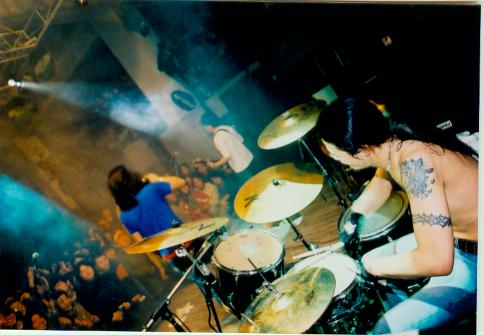
Thin Man (瘦人) @ That’s Beijing showcase
任何对北京朋克/摇滚历史、人文和城市音乐社会学有兴趣的人都应该翻开Dave O’Dell写的回忆录——分不开一睹为快。就像他在自序里说的,Dave“用了很多年鼎力支持1995——2003年间最早的中国朋克乐队。” 分不开所讲述的故事,不仅仅是以性、毒品和朋克为噱头的畅销文学,而是以个人历史为前沿,展现中国地下音乐辉煌年代的大图景。可以说是一本北京版本的Please Kill Me。欲买从速。
书中提到的了一个名为Cocktail 78的乐队,作为一支首个登上长城演奏传奇乐队,却仅仅存活了六个月之久。成员由脑浊的肖容, PK14的 Jonathan Leijonhufvud, FM3的Christiaan Virant, Dave(本书作者,同时是脑浊乐队的bass手),以及Jerry Chan组成。如今的Jerry Chan,在北京媒体界有着更为人熟知的头衔:the Beijinger杂志的创始人兼编辑之一,True Run Media的杂志总编。但在1999年, 他还只是一个从美国初到北京,热爱音乐的毛头小子。Dave在书中说:
我们在考虑组乐队的时候,Jerry就想加入我们。Jerry 曾经是一个自由写手,正好在[Beijing Scene]杂志社被查封的时候来到北京……Jerry那种强烈的主唱台风和我们的歌词融合的特别好……我们第一次演出的时候,有一首主打歌[down to the river],当时我就相信,Jerry的确是那种任何乐队都梦寐以求的主唱,但在排练中我从没见过他释放出这样大的能量。
逐渐地,Jerry融入到了摇滚圈当中,成为了一个驻足者和旁观者,而后更是一个推动者。旁边儿在去年十二月,和Jerry Chan 展开了一次促膝长谈,主要谈到了从90年代末期开始,中国北京地下摇滚圈的变迁和他个人的北京摇滚经历。

旁边儿: 让我们从Cocktail 78 乐队开始。追溯到当时,成员组合看上去挺有意思:你,脑浊的肖容,PK14的Jonathan Leijonhufvud,FM3的Christiaan Virant,以及Dave O’Dell……你们几个人是怎么认识的?
Jerry Chan: 当我99年第一次搬到北京的时候,准确地说,这里还没有一个圈子的感觉。只能说,这是一个封闭狭小的微型社区,来往的人都熟识彼此,大家都是朋友。当时我和老赵的关系很近……我已经很多年没有再见到他了。现在回忆起来,我们熟识的那段时间,他正好处在他事业的一个转折点,他曾经是一名很成功的记者,但当时他在考虑转型。我们经常混在一起,都特别喜欢音乐,花大把的时间聊音乐。也是在那个时候,Jonathan, Jonny也搬到北京来了。我是在国际噪音阴谋的一次演出上认识他的,他当时是乐队来中国的中间人。从此我们就一直是哥们儿了,开始一起玩音乐,瞎闹,制造各种噪音,自娱自乐。Dave当时一直都在,火热地忙于他的中国摇滚网站,他后来做这个网站做了很久。Dave可以说是我们的一个推动者,因为他可以从网站的投资人Peter Loehr手里拿点钱支持乐队的花销…但很不幸,因为正赶上Web 1.0时代终结的尾巴,他的网站最后也就只能不了了之了。不过,这算是他自己在中国的一个美好而短暂的创业经历。
由此,我们三个人就开始一起即兴排练,在Dave的介绍下,我们认识了地下婴儿的高氏兄弟。如果我没记错的话,排练室就是在他们家的院子里,我完全不记得具体是在哪儿,北边的什么地方好像,后来我才知道那是一个防空洞。当时所谓的地下室就是这样的,比现在酷多了。我们就整日在那里各种瞎折腾,大多数时间都是在制造噪音。我们的想法也随便得很,毫无章法,只是想能噪则噪,尽量往野了整。而且我们每个人的想法和感觉又比较相近,尽管又有各自钟情的手法。然而就在这种无序的即兴排练的间歇,乐队的雏形显现了,我没记错的话,当时一股脑儿弄出了8~10首歌。确实感觉晕大了。有一首还不错,取名叫[“Over”],但还不是我们最好的,我们即兴出了很多精彩的段落,尤其有一段,特别好,但是很遗憾……因为Jonny实在太完美主义了,他想把那段最好的录下来,用磁带反复录了几次,我清清楚楚地记得,最好的那段后来被他不小心地洗掉了……对我们来说,这是最美好的一段经历,因为那种真实地无所顾忌,漫无目的的感觉是最美妙的,玩high了就好,从来不管好还是不好。松散癫狂中弥漫着幸福的滋味……可能唯一的诉求就是能找个地方演出。

Dave和肖容,脑浊表演,2000年10月份
机会有很多,但是时机不是很好,大家正巧都有各自的事忙,肖容当然要兼顾脑浊,Jonny自己有别的事,老赵当时虽然还没开始弄FM3,但是也就在他开始FM3之后,就和张荐一起做实验噪音去了,而我自己也处在两个工作的交接点,我人生中很多具体而且重要的变革也正在那时发生。所以我们耽搁了一段时间,结果还是有一天,机会还是来了,Dave说:“我找点钱,咱们来正经录点东西,不能就这么浪费了。”于是我们就去了之前听说过的一个棚,在新街口,应该现在还在。
旁边儿: 你记得那个录音棚的名字吗?
JC: 我忘了……Jonny肯定知道。是一个经常录古典音乐的地方,录音师都很老派,但对我们来说就是一个相当好的磁带录音棚了。我们把它租下来之后,录了两首歌。用了整整一个下午。
旁边儿: 所以你们是录在磁带上?开盘带那种?
JC: 对,如果我没记错的话……那是在2000年,但是棚里的人都差不多四五十来岁,还是很老派的,那天最逗的就是他们,因为他们那儿以前没来过像我们这样的人。去他们那儿的都是那种学院里搞严肃古典的正经人,而我们一看就是一帮颓逼……我们虽然没有弄烂人家的东西,但是我喝的很大。正好中午又刚吃了顿火锅,在北京最初的时光,每天都是这样的,太high了,二锅头太牛逼了。当然慢慢地,在几次惨淡的二锅头经历之后,你肯定会慢慢喝的少了,但那时候,仍然在满脑子的兴奋里,有二锅头和音乐相伴的,那个摇滚的北京下午是我至今最难忘的经历。
除了在录音棚录歌,我们还参加了几场演出……很遗憾我错过了最好的那次:他们在长城演的那次,谁也说不准,可能在效果上不是最好的,但是蜿蜒的城墙和心气儿决定了一切。当时好像是因为我和女朋友出了点问题……哦不对,不是和女朋友,记不起来了,总之我错过了那场演出,被人们称做“摇摆长城”,Cocktail 78是第一个在长城演出的朋克乐队。那天是沈岳替我来完成了人声。
不在中国?上youtube看看。
剩下的演出经历都是难以忘怀的。曾经有一个朋克据点,其实就是一个摇滚演出酒吧,在紫竹院公园,开不长时间就关门了。我们去的那次,酒吧突然停电了,结果我们就把设备挪到酒吧门口,站马路牙子开演,那会儿还正赶上晚高峰,六点钟左右。太逗了那天,我确定听上去效果很烂,但是那才是朋克摇滚的感觉。周围有一帮民工和路人围观,看我们各种起哄各种乐。总之那次真的很高兴。之后我们还在臧天朔开的酒吧,好像叫彩虹什么的一地儿,在那儿演过几场,差不多每次都有30来个人,都是朋友。我们还去过在凯宾斯基饭店那里的Keep In Touch 演过,后来他们搬到了北影附近的臭河边。那会儿那里正好主办一个音乐节,我们也加入了。所以总体上说,乐队的业绩和经历就是这样,我们总共演了六七场,进过一次棚。

Cocktail 78在工体附近的水印儿酒吧演出海报,2000年6月10日
最后的解散也很顺其自然:首先是我父亲病重,我不能参加排练,之后大家也都各忙各的事去了。算下来,乐队虽然仅仅存活了六个月的时间,但这是我们人生中屈指可数的最美好的六个月之一。有时候我自己想想觉得挺不甘心的,想当初要是能多录点东西出来就好了。但不管怎么说,我们最终还是录成了那一首歌。
旁边儿: 那次进棚,你们只录了一首歌是吗?
JC: 嗯,其实我们还录了一首,只是录的不是很好。我的人声彻底没声,错位了。我记得录的时候,我已经彻底喝大了 ……我们当时就特想弄一个Stooges那样的乐队。我是Stooges的超级粉丝,我就一心想着要像Stooges,也不知道大家是不是也真这么想……总之我们就想要一种Iggy/Stooges 的车库摇滚风。Jonny对音乐上的东西比较熟悉,肖容有他自己的声音,我们就这么胡乱瞎弄,直到[”Over”]这首歌出来,[”Over”]不是最好的,后来有一个特别好的段落,我之前也说过,被Jonny给洗掉了。唱完那段最好的之后我的嗓子就已经开始不行了,之前我一直没用麦克风,后来嗓子受不了了才用的,如果能录下我没用麦克风的那段就好了,听上去强多了。

Jonny,肖容和老赵在录音棚
乐队对我们每一个人来说,都是最有意思的经历,每一个成员在离开乐队之后,都各自投身到了不同的领域,继续做更有趣的事情。在九十年代二十一世纪初的北京摇滚乐圈,我们曾经活跃过的时期,是一个非常有趣的过渡期,离鼎盛的大爆炸很远,同时彼此之间也毫无党羽之分,你明白我的意思吗,朋克在那个时候可以去看各种类型的演出,他是不会受别的圈子排挤的。崔健可以去任何地方,去帮助和支持各类演出。流派之间没有形成圈子。即便我们都应该承认,我是一个风格党,你也是,我们都是,因为我们一直是受风格和流派的指引去了解音乐。所以这也使得当时的一切都充满生机。在那个时期,声音美学和流派的进化依旧处在停滞的阶段,但是我却觉得,周围总是有很多有趣的人在做闻所未闻的事,包括我们自己,虽然我们不够优秀,但是这种真实的热忱是这个场景里最宝贵的东西,没有现在这么浑浊。长发飘飘的金属男们,早期的摩登天空,无聊军队那一拨人,还有以Wengweng为首的新生DJ队伍。我们都很熟,每次见面都好像发生在高中大食堂里的午餐情景。彼此之间没有隔阂与戒备,小集团当然在悄悄产生,但演出会把所有人都聚到一起。窦唯演出,所有人都会去。崔健演,所有人都会去。不管你做什么样的音乐,你从哪里来,这个社交派对是因为共同的信仰催生的。很生猛很直接,很多欢乐。
旁边儿: 对中国地下甚至实验音乐场景的源起,一直是我们所关注的。杨海崧和颜峻,还有你在之前都提到过——1999年这个年份,对中国地下音乐场景是有重要意义的。那是颜峻刚刚搬到北京的时候,杨海崧也是,当时,PK14是一个与众不同的乐队,但在北京的摇滚圈,他们觉得有家的感觉。虽然颜峻现在在做冷僻的噪音和声音艺术,但那个时候,也是他融入到北京朋克摇滚圈的时候。他们都不约而同的觉得,当时的氛围和感觉比现在要亲切地得多。
JC: 是的,没错。我那时和杨海崧是认识的。我那时还不知道颜峻,但是我一直有关注他的动向,他为地下音乐的贡献很大,是很值得人尊敬的。我自己现在的音乐品味相较实验噪音一类还是比较传统的,对说唱、爵士和雷鬼依旧情有独钟。但是我喜欢噪音的美学,高中时曾经一度很痴迷工业音乐,对噪音和前卫音乐也早有耳闻。回到99年的梦境里,我们都不知道自己在做哪一种风格的音乐。这种心气不仅弥漫在音乐圈,当时,我记得和现在有名的影像艺术家赵亮挺熟的。那会儿他就是整天埋头鼓弄一些视频剪辑设备。the Beijinger的前身叫That’s Beijing, 那时我们每月都会组织策划一些音乐演出。我记得赵亮也来演过。9.11刚刚过去的时候,赵亮做了一个双子塔反复倒塌的视频,中间交叉剪辑进螳螂互吃的镜头,特别逗,现在看来,虽然有点粗糙,不够老练,但还是挺酷的,有一股诚实的探索精神在里面。

FM3,颜峻和武权在北京海淀的万圣书园表演,2003年4月8日
大家差不多都在同一个水平线上。对于早期的FM3,我没有怎么深入了解他们的音乐,但是那会儿他们刚玩的时候,我经常去老赵家,看他和张荐玩键盘。老赵曾经是受过古典钢琴训练的,张荐也是一个非常好的键盘手。当时有个新的软件叫“Fruity Loops”,我还记得他们一开始玩的时候老是因为这些层出不穷的新玩意儿兴奋、惊讶不已。

丰江舟跟Dead J表演
接下来我要说的这个人可以说是从音乐转入影像领域的一匹黑马——丰江舟。说起丰江舟和苍蝇,不得不提到我当时的工作,因为是那个工作让我有机会听到苍蝇,知道丰江舟。我当时在Steven Schwankert那做事, 他现在跑去做SinoScuba了,他曾经在北京呆过很长时间,弄过一个叫“China Buzz”的网站,我是他网站的员工。那是第一个我真正喜欢的工作,我终于庆幸我可以不用再当老师了。他当时在做“入口网站”,现在这个说法已经不存在了,我们试图开展电子商务业务,在网上卖东西,但是我们卖的东西很特别,就是那个时期的中国摇滚唱片。当然市场很小,肯定不能做到很成功,所以后来也逐渐被他冷落了。显而易见,当时的时机还未到,做电子商务还尚早。我不知道丰江舟现在还记不记得我,当时我们曾经聊过几次。我当时特别喜欢类似耶稣蜥蜴的乐队。我也听了一些稍微前卫一点的中国乐队,但是唯独觉得苍蝇更有趣。我记得我去丰江舟的家,觉得他真的特别有意思。我觉得他一直很前卫,无论当时还是现在。还有一个要说的人就是虎子,来自河南的虎子,现在他有个乐队叫宠物同谋。当时他的乐队叫病医生。他也是一个挺有意思的哥们儿,他是一个很好的吉他手,也是一个很爱学习的人,他的思维很开阔。当时圈子里的所有人都有这种劲头,不停的扩充自己,试图了解和发现更多有趣的东西。我记得有一个晚上,我和虎子,虎子乐队的人在老赵家,还有Dave和张浅潜。我们一起呼了很多当时,我给他们看了Portishead在纽约的演出录像,给他们全震了。我当时觉得挺自豪的,心想“我可以真的带给他们新的牛逼的东西,帮他们找到一个新的方向”。
可以说那时候,我既是一个圈子内的人,又是一个旁观者,我也想去写写这些人的故事。但是我一直没有时间和精力,我的工作一点点把我领向了别处,但是能亲身经历这些,就很快乐了。我已经多年都没有怎么关注音乐圈的动向了。说起来觉得挺讽刺的,即便我们[the Beijinger]一直有写音乐的部分。我以前总是觉得中国需要一个柯特 科本时刻。但是现在其实完全不需要了,参照日本,一面是卡哇伊萌系美少男乐队,一面也有世界知名的Boredoms、Melt Banana这样的乐队。差距很大,但是都可以共存,被主流社会认可。所以我觉得中国也会慢慢多元化起来,无论是哪种音乐,都能在主流社会分一杯羹,我将会一直乐于关注这样的发展进程的。
旁边儿: 我很想知道在90年代末21世纪初,有什么渠道可以促使你深入挖掘到地下音乐圈中去,你之前是怎样听说中国摇滚乐的?
JC: 在我搬到北京之前,我就对中国摇滚乐很感兴趣,因为我当时正在写我的博士论文,主题就是这个。后来我通过邮件认识了Kaiser Kuo,他是一个美籍华人,当时在中国玩摇滚。当我到了北京之后,就很快见到他,通过他认识了很多摇滚乐手。那个时候没有mp3,Napster还没出来,但有很多小店卖打口带,打口盘,这些小店对像我一样的音乐书呆子来说简直就是天堂。以前在奥斯汀的时候,我就经常去33 Degrees 和Sound Exchange这些唱片店,花光我所有的钱,就像毒瘾一样。所以来到北京之后,就觉得太爽了,美食,美女,最重要的是你可以花30块买到整套的Feli Kuti。这些打口店一般都在五道口,5到10块一张。很有趣,卖盘的都是一些大妈,一些可能是摇滚青年的家人,还有一些操着浓重的四川口音,都差不多四五十岁,别小看她们,她们对自己的商品特别熟悉,你走进去,大妈就会用一嘴四川味的普通话跟你说:“这个啊,新到的麦偷力卡(Metallica),特别棒!你喜欢说唱?斯农皮 道各(Snoop Dogg)?”特别逗,一点儿都不含糊。打口盘不仅来自美国,也有很多来自法国和日本,我知道有一些人白手起家在做这个生意。打口盘对中国地下音乐圈的发展做出了巨大的贡献,这种买卖和当时中国很多行业一样,徘徊在法律和制度的灰色地带,对当时热爱音乐的中国年轻人来说就是从天而降的礼物。
另外,说起宣传这一块,当然和我的现在的工作也是密不可分的。我记得当时,大概有一到两个英文的杂志来介绍北京摇滚,包括我们做的China Buzz网站,涵盖最广的是杂志[Beijing Scene], 现在的[Beijinger]其实就是那时候的[Beijing Scene]。当时他们的团队是:[Anna Sophie Loewenberg] 是活动编辑. 主编是Jeremy Goldkorn, 就是后来创建单位网的那个人。创始人是Scott Savitt, 后来因为一些事情被驱逐出中国了,他当时是唯一一个做类似推广的住在北京的老外。Jeremy 和 Anna Sophie也是顶级乐迷,他们当时的活动编辑做的还是不错的,很多人从中了解到很多东西。所以总结说来,当时人们了解音乐的方式主要有三个:心口相传、打口盘,还有[Beijing Scene]杂志。
旁边儿: 那么逐渐地,你也开始创建你自己的杂志[That’s Beijing],而且有一阵子,你们策划每月一次的摇滚演出。能跟我们聊一下这个计划具体是怎么实施的?
JC: 我们2001年开始弄[That’s Beijing],前一阵子我们刚刚庆祝了十周年的生日。显而易见,十年间我们改了名字,也换了不少编辑……这是一个漫长且戏剧化的经商故事。在起始阶段,我是早期编辑团队中的一员。我手下负责的是美食和饮品专栏,但仍旧对音乐圈很熟悉,也经常参与音乐专栏的工作。之后因为要处理家里的事,我需要回美国一趟,当我回来的时候,我们就商量准备启动市场部,想通过策划活动来给杂志做宣传。Mike Wester,现在仍然是我们的主管,我们当时一起运作市场部的活动。

第一期That’s Beijing杂志
当时首先想到的就是做音乐演出,因为在当时来讲,音乐演出带来的影响力比现在要大得多,即便能做的演出,能拉拢的资源比现在少很多,有一种艺术大学学生会组织周际论坛的感觉。也正因为这个原因,我们找的乐队都是当时最好的,用现在的话说,就是每次都有策划音乐节的感觉。像二手玫瑰,无聊军队,木玛,布衣等,有一次还找来了崔健。我们策划了大概七八次,最后一次我记得不是很好,不是因为谁没弄好,就是感觉不是很好,所以在那之后我们都有点懈怠了,就没再继续做。我们接着策划了很多其他种类的活动,Jon Campbell那时候和我们一起工作,他成为了我们酒吧和俱乐部专栏的编辑,所以从那之后,他开始更多的了解摇滚圈和整个音乐圈的动向。这一切发生在2002到2003年之间,我记得我们做的最后一次演出是在2003年。
That’s Beijing “月中音乐节” 海报 (通过 Jon Campbell
二手玫瑰在That’s Beijing办的演出

瘦人乐队在That’s Beijing办的演出

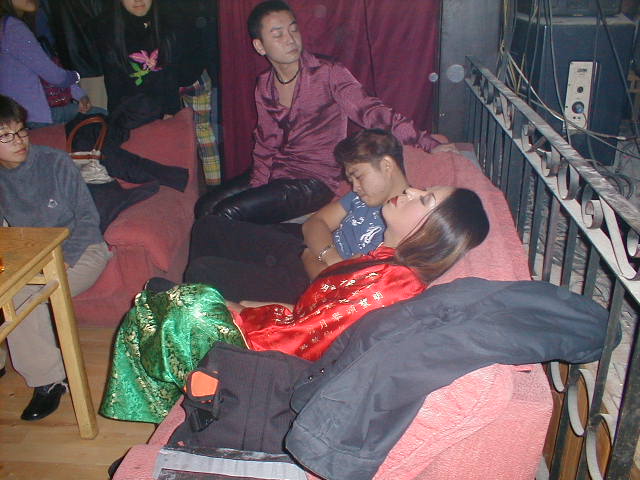




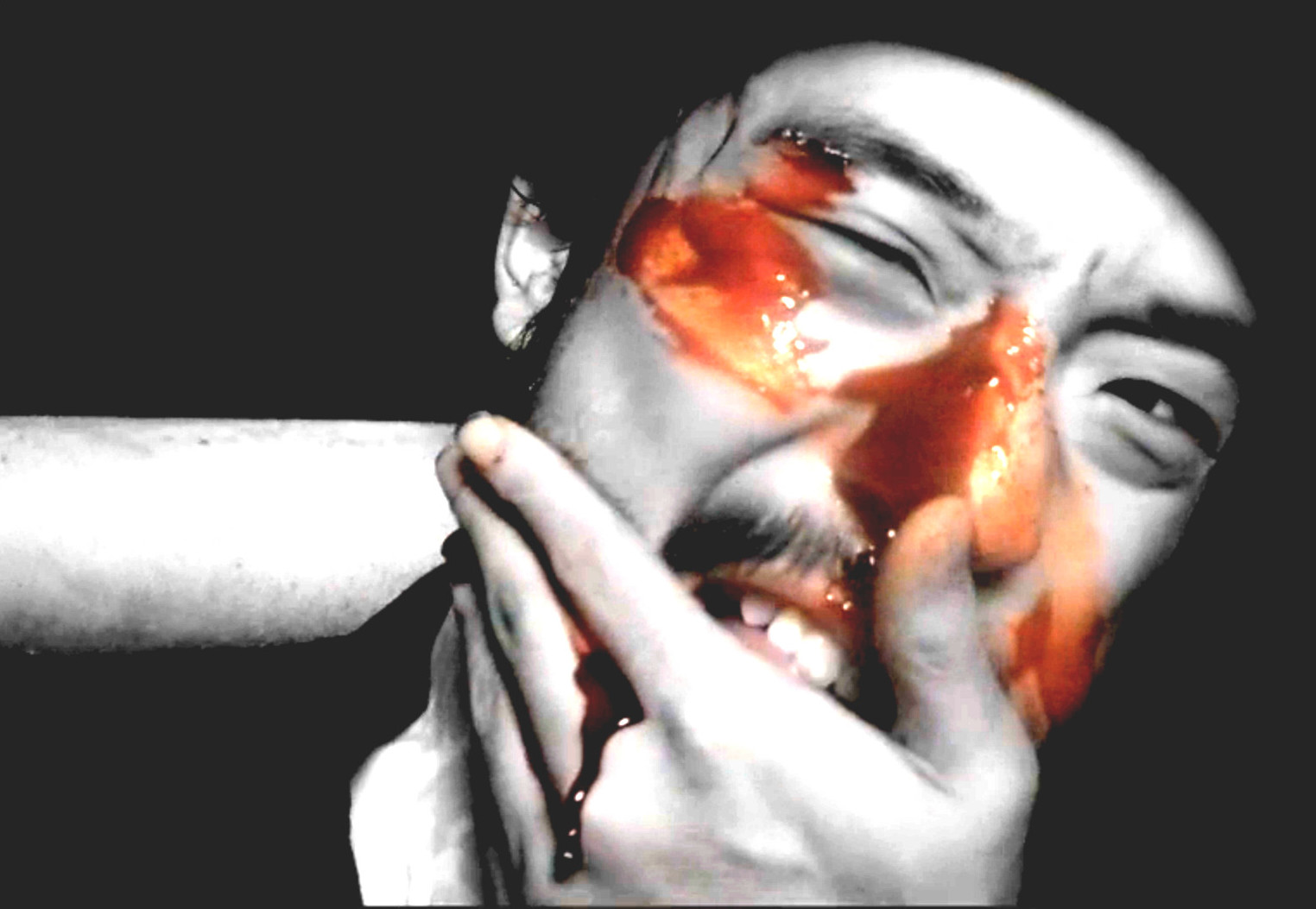
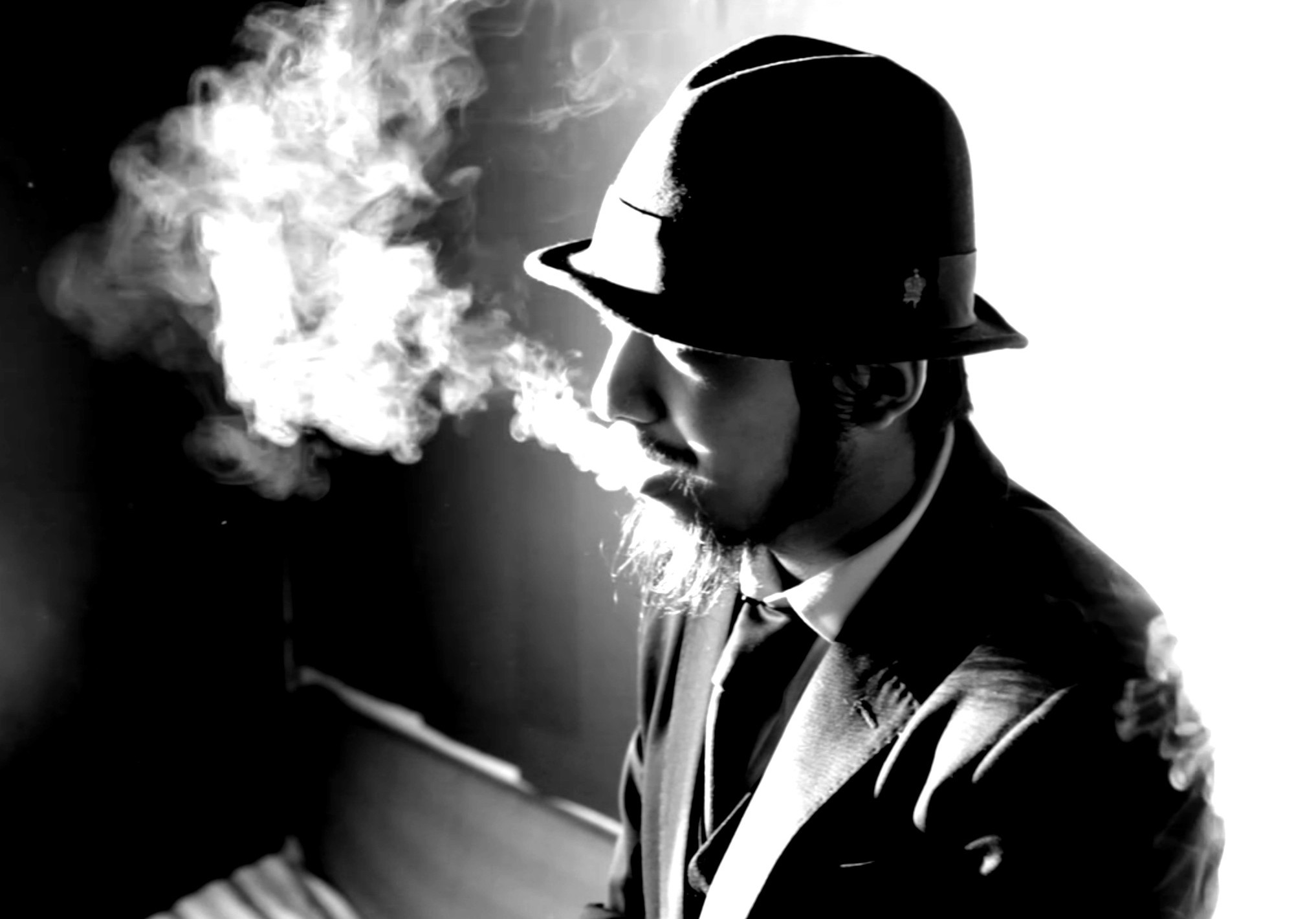

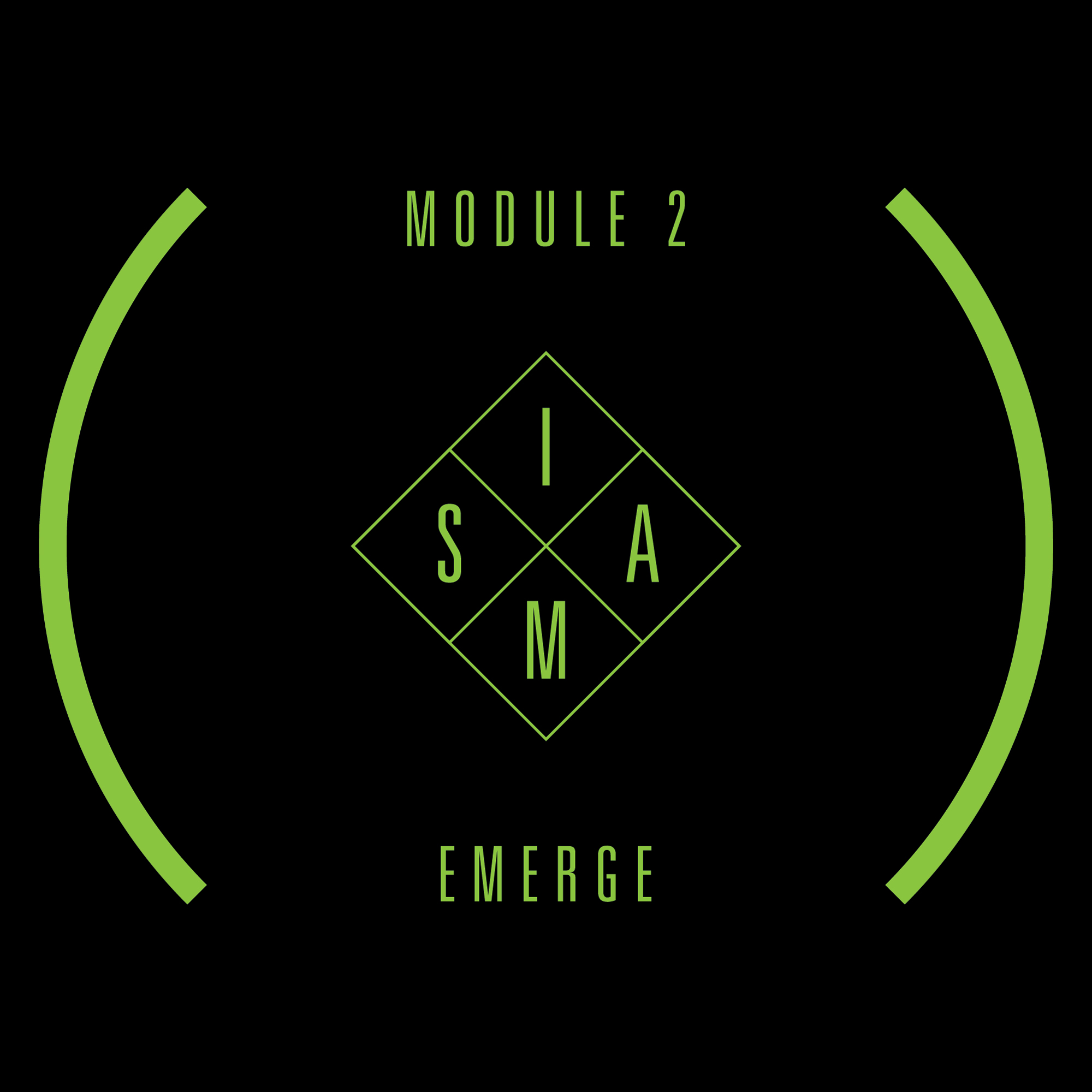
As a Beijing expat and music lover, I enjoyed this blast-from-the-past very much.